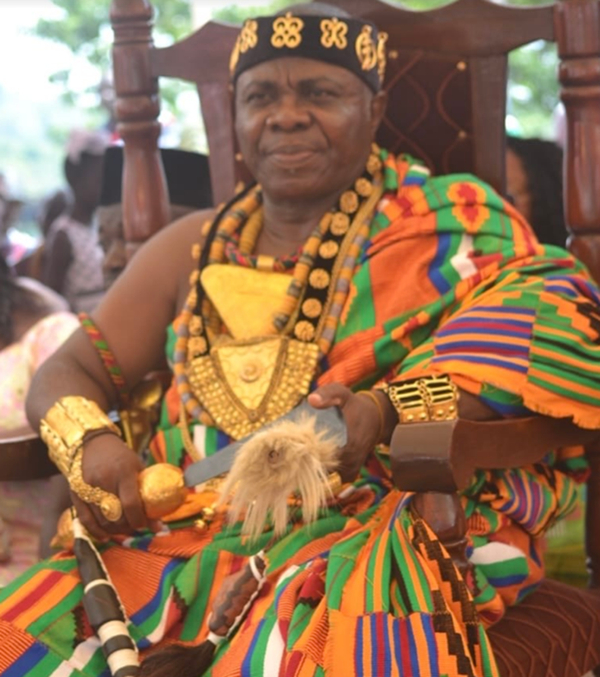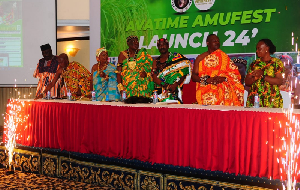The Avatime Traditional Council (ATC) comprising legitimate chiefs, queen mothers and elders of seven communities located within the Ho-West District of the Volta Region has launched the 2024 edition of the Avatime Amu Festival, dubbed 2024 Amufest.
‘Amu’, the local name for mountain organic brown rice cultivated by natives of Avatime has been celebrated annually as a festival on a rotational basis among the seven communities under the auspices of ATC.
The celebration of this year’s festival event is being hosted and facilitated by Avatime Gbadzeme, one of the Avatime communities under the theme, “Sustaining Avatime as a Climate Resilient Community through mountain brown rice production, culture and Eco-tourism.”
The launch of the 2024 edition of the Festival at La Palm Royal Beach Hotel in Accra was held under the distinguished patronage of Otumfour Baidoo Bonsoe XVI, Paramount Chief of Ahanta Traditional Area (Ahantamanhene) as the Chairman for the occasion as well as other prominent chiefs and citizens from Guan and Avatime communities.
The event also showcased the display of the cultural heritage performances and eco-tourism potentials of Avatime as well as the organic mountain brown rice products, their nutritional values, and socio-economic significance.
Osie Adza Tekpor VII, the Paramount Chief of Avatime and President of Avatime Traditional Council, in an address read on his behalf by Okusie Kpornuglo X, Chief of Avatime Dzokpe, expressed disappointment at chieftaincy issues and disputes in some Avatime communities that are threatening peaceful co-existence and harmonious relationship required for development, growth and sustainability in these communities.
“Let us guard against using chieftaincy issues to create enmity, divisions, and factionalism. What Avatime needs at this critical era is sustainable growth and development characterized by good roads, investment in agriculture, and tourism development among others.
It is also important for us to revive and reinforce our peaceful co-existence and bond of unity bequeathed to us as a legacy by our ancestral forebearers. Let us unite and ensure the promotion of Amu Festival as a brand symbolizing the identity of “Kedeone”, he lamented.
He stated that the choice of the theme for this year’s Amufest was aimed at sensitizing citizens of Avatime and other parts of Ghana on the need to guard against the destruction of the environment and ecosystem and preserve cultural heritage.
“I urge my colleague chiefs, community opinion leaders and the entire indigenes of Avatime to be guided by the tenets of patriotism and ethical values to ensure the safeguarding of the Community as a climate resilient area to promote eco-tourism, cultural heritage, cultivation of mountain brown rice and other essential crops,” he remarked.

Osie Adza Tekpor VII underscored the need for relevant policymakers and institutions including regulatory and law enforcement bodies to create the enabling environment to curb the rising incidence of illegal mining, popularly known as Galamsey, and the wanton destruction of water bodies and the entire environmental ecosystem.
In his opinion, institutions such as Parliament, the Judiciary, security personnel, and the central government must rise to their responsibilities to stop the menace of ‘galamsey’, considering the adverse effect of the reckless practice on the health of citizens and devastating impact of the country’s ecosystem.
Speaking on behalf of the Minister of Chieftaincy and Religious Affairs, Hon. Stephen Asamoa Boateng, the Principal Registrar at the Ministry, Doris Osafo Aye entreated Traditional Councils in the country to use the celebration of festivals to foster unity and peace as well as boost the promotion of tourism for economic benefits and preservation of cultural heritage as a legacy for future generations.
She described the theme as “encapsulating the essence of preserving tradition, embracing innovation, and safeguarding the country’s environment”.
She admonished citizens of Avatime not to allow chieftaincy differences to subvert the growth and development of the ecological potentials, peace, and rich traditional culture.
General News of Tuesday, 10 September 2024
Source: www.ghanaweb.com

















